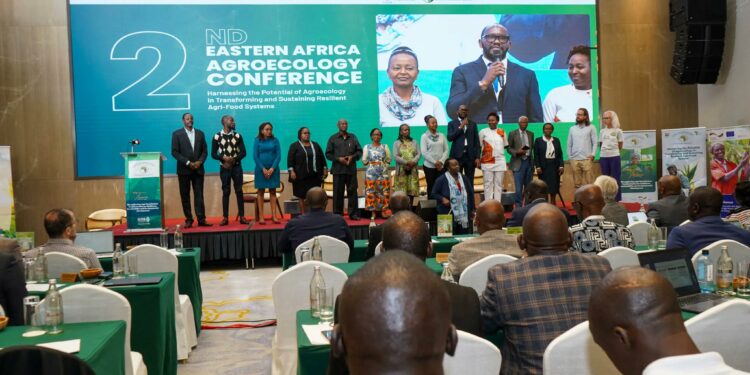The survival of small and medium enterprises (SMEs) in Africa’s agroecology sector remains precarious, with financial constraints, policy gaps, and limited market adaptability posing significant challenges.
While these enterprises are crucial to advancing sustainable agricultural practices, they continue to struggle due to a lack of structured support systems.
Speaking at the 2nd Eastern Africa Agroecology Conference on March 26th at Argyle Grand Hotel, Nairobi, Kenya, Thomas Obiero Were, the Director Program and Enterprise Development at Agile Consulting Limited underscored the need for urgent intervention. Representing the O-Farms Project, Obiero proposed strategic solutions aimed at enhancing the resilience and scalability of SMEs within the zero-waste and circular economy sectors.
The Kenya Agribusiness and Agroindustry Alliance estimates that SMEs account for 95 percent of firms in most African countries. However, their survival rate is alarmingly low. A 2017 study on Critical Success Factors for SMEs in Africa, conducted by Jacqueline Douglas et al., revealed that 70 percent of SMEs fail within their first three years, a statistic that places agroecology innovators in a particularly vulnerable position. Given the capital-intensive nature of sustainable agricultural innovations, securing adequate funding remains one of their greatest challenges.
Juliet Kanyesigye, the proprietor of Kanyes Diary Goat Farm, an urban goat farming project in Uganda, illustrated the financial struggles faced by agroecology entrepreneurs. Her business, which produces goat milk soap, organic body lotion, and other cosmetics through a zero-grazing management model, faces significant investment costs. She noted that transitioning to agroecology is not only expensive but also requires extensive training in organic farming techniques.l
“It is very hard for young innovators in agroecology to start small firms because of inadequate funding and technical challenges in making some of these inventions, like organic pesticides,” Kanyesigye said.
“Training agronomists on how to spray organically and produce organic pesticides is extremely costly. Additionally, market adaptation remains a challenge as we compete with imported products. We have to do extensive sampling and advocacy to convince consumers that locally made products meet high standards.”
Despite the growing recognition of sustainable business models, financial support for agroecology SMEs remains inadequate. The absence of structured financial instruments, such as targeted tax breaks and grants, continues to limit their ability to scale operations effectively.
Policy Gaps and Limited Awareness Among Agroecology Entrepreneurs
Obiero also emphasized the critical role of policy frameworks in supporting agroecology SMEs. While both Kenya and Uganda have made strides in promoting sustainable agriculture and waste management, the awareness of relevant policies among SMEs remains strikingly low.
“Only 44 percent of SMEs in Kenya are aware of relevant policies, and in Uganda, the figure is even lower at 18 percent,” he explained. “This lack of awareness prevents SMEs from taking advantage of government incentives such as tax breaks or subsidies, which could significantly enhance their growth potential.”
The fragmented nature of policy enforcement further compounds these challenges. Regulatory frameworks in both countries tend to focus on larger businesses and municipalities, leaving SMEs with little guidance on how to integrate circular economy principles into their operations. The absence of clear standards for circular economy products, combined with disjointed government agency efforts, creates an environment where SMEs struggle to navigate regulatory requirements.
SMEs as Catalysts for the Circular Economy
Despite these obstacles, SMEs remain central to economic growth and environmental sustainability in East Africa. In Kenya, the sector contributes 40 percent to GDP. Beyond economic contributions, SMEs employ the majority of the workforce in both countries, with about 75 percent of the population relying on them for employment. Their adaptability allows them to drive innovation, particularly in sustainable practices, making them critical players in the transition toward a zero-waste and circular economy.
Obiero highlighted that while SMEs have the flexibility to embrace new technologies, their success is heavily dependent on access to adequate financing and a supportive policy environment. The O-Farms Project, through its Revenue-Based Financing (RBF) model, is addressing this gap by providing SMEs with financing based on their revenue rather than equity. This approach offers a viable alternative for businesses that lack collateral or a strong credit history, enabling them to secure funding without relinquishing ownership stakes.
“By providing better access to finance, we can help these enterprises invest in the necessary infrastructure, technology, and skills to implement circular practices effectively,” Obiero noted.
Bridging the Financing Gap Through Public-Private Partnerships
Strengthening public-private partnerships (PPPs) is also essential in addressing the financing shortfall that agroecology SMEs face. Obiero pointed to Kenya’s County Green Investment Facility and the O-Farms Circular Business Accelerator as successful models that provide SMEs with financial resources and infrastructure. These collaborations have demonstrated the potential of leveraging government and private sector support to sustain environmentally friendly businesses.
He also noted that governments must develop national circular economy guidelines that are specifically tailored to the realities of SMEs. Additionally, policies should offer targeted incentives that ease the cost burden of transitioning to sustainable business models.
The long-term success of agroecology SMEs is integral to East Africa’s broader sustainability goals. However, without substantial financial support, streamlined policies, and improved institutional backing, many of these enterprises will struggle to survive, let alone thrive
Do you have a story in your community or an opinion to share with us: Email us at editorial@watchdoguganda.com













